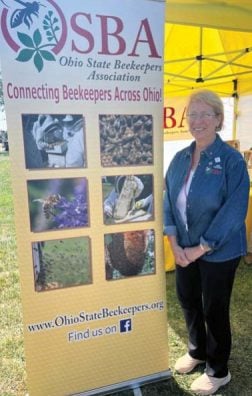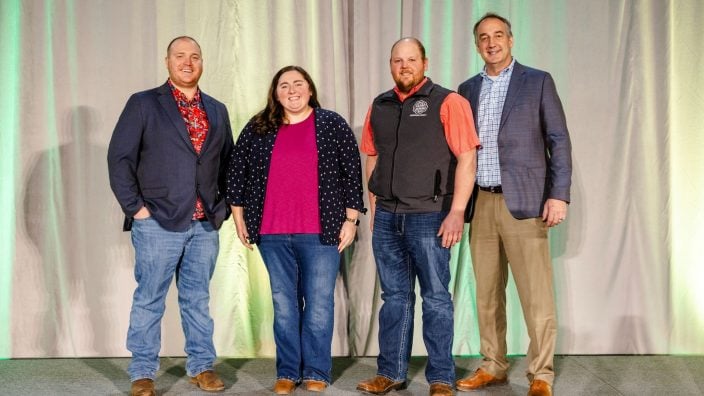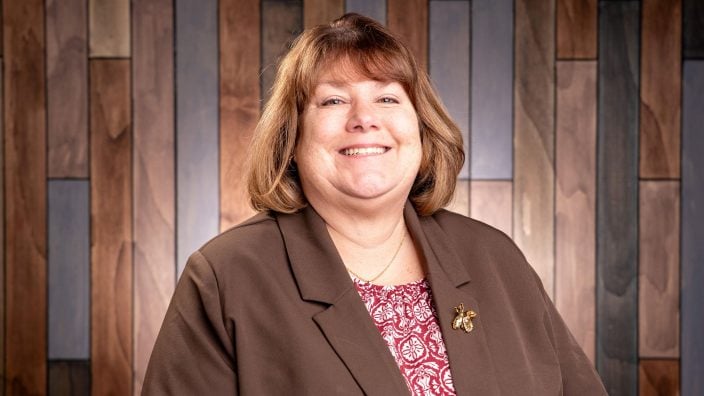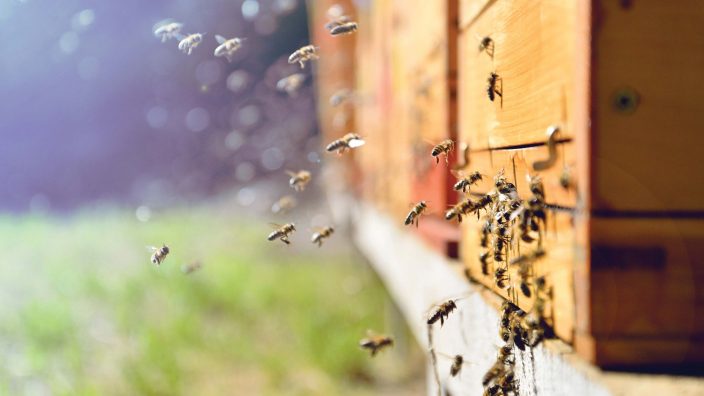Applications for Ohio Farm Bureau Health Plans now available
Members have three ways to apply: contacting a certified agent, calling 833-468-4280 or visiting ohiofarmbureauhealthplans.org.
Read MoreBeekeepers need to be very clear about the goals of their business endeavors with all parties, including their insurance agent, no matter how big or small the bee farm is.
Beehives might be wintering at the moment, but business planning for the spring buzz is happening right now.

Whether a hobbyist with a few hives in the backyard or a commercial business, making sure a beekeeping operation has the right liability insurance coverage is essential.
“Beekeepers are bee farmers,” said Peggy Garnes, president of the Ohio State Beekeepers Association. “You have to prepare for all seasons, whether a farm or a beehive.”
Having the right insurance makes all the difference as well, she said. Garnes, who is a Nationwide customer herself, notes that Nationwide was recently highlighted in a Farm Bureau article written for OSBA’s latest newsletter.
Garnes has been in the beekeeping business for more than 20 years, starting out with hive-less and sting-less Mason bees and moving onto honey bees, despite having a honey bee allergy.
The Medina County Farm Bureau member has taken her knowledge on the road and spoken about sustaining honey bees in many states. She is an advocate for having hardy northern bees who are used to their own biodome and can survive through an Ohio winter.
Garnes’ stresses not only the importance of beekeepers to register their hives, noting that it is the law in Ohio to do so, but also the importance of talking to their insurance agent about their beekeeping intentions.
“People often decide they are going to do something like beekeeping but making sure they have the right insurance coverage is the last thing they think about, until it’s too late,” said Lance Reeve, Nationwide senior risk management consultant.
According to Nationwide, there are two key components to protecting your beekeeping operation. First, as Garnes mentioned, make sure you are in compliance with state and local regulatory statutes. Second, know what type of beekeeping operation you have, your plans for the future, and have an open conversation with your insurance agent.
Beekeeping, which has been growing in popularity across the state for years, may or may not be covered under homeowners insurance, and liability coverage alone may not be enough, according to Garnes.
“Property coverage is important,” she said. “It costs $800-$1,000 to start a beehive, and then people paint them white, which makes them a target for theft.”
It is also very common that beehives are placed or rented on property other than the beekeeper’s property. Those situations have to be properly protected as well. What if the hive is stolen, or a worker is stung, or nutrient drift from a farm field wipes out a colony? These are all coverage questions that need to be answered by talking with an insurance agent, Garnes said.
“If someone is renting beehives from an owner, they’ll want to make sure that they have the appropriate liability contract in place that properly transfers liability and responsibility from the owner to the person who is renting,” said Derek Bredlow, Nationwide farm product manager.
When a beekeeper is selling honey, “that’s a whole other issue,” Garnes said.
When it comes to product liability, food safety should be a concern. If a commercial beekeeper is selling to food manufacturers to be incorporated in other foods and there is something wrong with that honey, or it’s contaminated in some way, it’s important that they be covered. The same goes for hobbyists selling products at a farmers market or festival to cover product liability.
“On the commercial side, it’s important to have trained personnel, food safety plans following the Federal Good Manufacturing practices, and there are audit programs,” Reeve said. “Hobbyists would be regulated locally and by the state department of ag, so they’ll be making sure they have food safety measures in place, but not to the same level of the commercial audit program.”
Garnes encourages all beekeepers to be very clear about the goals of their business endeavors with all parties, including their insurance agent, no matter how big or small the bee farm is.
“You don’t know what you don’t know,” she said. “It’s better to be covered and be as transparent as possible with everybody.”


Members have three ways to apply: contacting a certified agent, calling 833-468-4280 or visiting ohiofarmbureauhealthplans.org.
Read More

Legacy nutrient deductions enable new farmland owners to claim deductions on the nutrients within the soil on which healthy crops depend.
Read More

Farmers, agribusinesses and community members are encouraged to nominate their local fire departments for Nationwide’s Nominate Your Fire Department Contest through April 30.
Read More

Introduced by Sen. Paula Hicks-Hudson, SB 120 would establish the Urban Farmer Youth Initiative Pilot Program.
Read More

Gases, vapors, and fumes can all create risk. How can we measure and protect ourselves from them?
Read More

The Ohio Farm Bureau’s Young Agricultural Professionals State Committee has named its 2026 leadership and the individuals who will be serving on the state committee for 2026-2028.
Read More

The Ohio Farm Bureau Foundation has multiple scholarships available to Ohio students from rural, suburban and urban communities who are pursuing degrees with a connection to the agricultural industry.
Read More

With 100% bonus depreciation now permanent, farmers can deduct the full cost of a new agricultural building in the year it’s placed in service.
Read More

Lincoln Deitrick was named the Outstanding Young Farmer, Denver Davis won the Excellence in Agriculture Award, and Margaret Houts won the Discussion Meet.
Read More

Michelle Downing of Franklin County has been named finance director of county operations for Ohio Farm Bureau.
Read More